- Home
- J. D. Rhoades
The Killing Look Page 19
The Killing Look Read online
Page 19
“Jesus,” Cade muttered.
Alton stopped next to Sorokin and slapped him on the shoulder. “Damned good man in a fight, though.” He sounded like a cattleman bragging on a prize steer, but the huge Russian smiled, revealing a mouthful of broken teeth. Alton turned back and kept walking toward the stern. Cade followed. A pair of sailors at work on some complicated web of rigging looked up at him suspiciously as he passed. One had the darkest skin Cade had ever seen, the other was a skinny white man with a livid white scar across his cheek.
At the stern of the boat, behind the rear mast, sat what looked like a wide cottage, complete with a chimney and a skylight. A pair of longboats sat on skids in front of the house. The captain walked between the boats, toward a heavy wooden door in the front of the house, fishing a large key from the pocket of his coat. He unlocked the heavy brass lock and gestured Cade inside. They entered a short, low-ceilinged corridor with doors on either side and one at the end that Alton opened with another key.
The captain’s cabin ran the width of the stern house. It was luxuriously appointed, with a carved bedstead along the back wall beneath a row of portholes that let in the daylight. Alton set his package on a low wooden table just inside the door, then took off his coat and hung it on a hook. He began unwrapping the package. “Can I persuade you to join me in a drink, Mr. Cade?”
“I’m persuaded, sir. And thank you.”
Alton pulled a bottle of brown liquid from the package. His voice was reverent as he pronounced, “The Glenlivet.”
Cade nodded as if he understood. “Okay.”
Alton looked annoyed at the obvious incomprehension in Cade’s eyes. “This is the finest Scotch whiskey in the world, Mr. Cade. Aged twelve years.”
“Lookin’ forward to it, then,” Cade said.
Alton took a pair of glasses from a cabinet on the wall.
“You have a beautiful boat, sir,” Cade said.
Alton stopped with the bottle in hand. “This is a ship, Mr. Cade. A boat is a craft carried on a ship.”
Cade thought of the sleek longboats he’d seen outside. “Ship, then. She’s still a beauty.”
“Ayuh, that she is.” A mollified Alton poured two fingers of the rich brown liquor. “Sad to say, she’s likely one of the last of her kind. Now that they’re near to finishing the canal in Arabia.” He picked his glass up and sniffed it delicately. Cade had no idea what a canal in Arabia had to do with anything, but he did the same. It smelled like whiskey to him. But when he followed the captain’s lead and downed the Scotch, he had to admit, it was as smooth and warm as any drink he’d ever had. “Good whiskey,” he said.
“Indeed.”
Alton gestured toward the glasses with the bottle, but Cade didn’t relish the prospect of making his way back across the waterfront and the rest of the Coast without his wits about him, and he could sense how this Glenlivet stuff could draw a man in. He shook his head and put his palm over the glass. “You go ahead, though.”
Alton poured himself another two fingers. This time, he sipped at the whiskey rather than downing it one gulp. “So, what can I do for you, Mr. Cade?”
“I need to get a message to Mrs. Hamrick. I’m going to need more information if I’m going to find out anything about McMurphy.”
Alton raised a startled eyebrow. “McMurphy, you say?”
Cade nodded. “She’ll know what it means.”
“Hmm.” Alton poured another two fingers of the whiskey. “McMurphy,” he said thoughtfully, and took a sip. “Second time I’ve heard that name today.”
Cade’s heart leaped. “You’ve heard something about him?”
Alton nodded. “I heard he’s dead.”
“Well, that’s what the Hamricks thought. They thought he’d killed himself years ago.”
Alton shook his head. “No. What I heard is that a man named McMurphy was murdered this morning. In a boarding house on Kearney Street.”
CHAPTER FORTY-FIVE
Cade pushed his glass across the table. “I think I will have another drink. If you’re still offering.”
Alton poured. “What is this McMurphy fellah to the Hamricks?”
Cade thought of the agreement he’d signed, about keeping Hamrick’s business secret. To hell with it, and with Hamrick too, he decided. “Mr. Hamrick’s old partner.” He tossed back half the drink. “He accused Hamrick of doing him dirty in a business deal a few years ago. They thought he’d done himself in. But then someone went after Mrs. Hamrick and the little girl. And, well, we got some information that this McMurphy was in town, stirring up trouble for the Hamricks and trying to blame it on the Chinese.”
As Cade was speaking, Alton had taken out a big Meerschaum pipe and begun packing it from a pouch in his jacket. “And you were sent aftah him, Mr. Cade, to do what exactly?”
“Figured I’d decide that once I found him.” He laughed bitterly and finished his drink. “Guess that plan’s gone down the drain.”
Alton took out a lucifer and lit the pipe. “Is Marjorie still in danger? From the Chinese, maybe?”
“No. It was never the Chinese. McMurphy had someone he’d been talking to that was going to try to make it look like the Chinese were behind it.”
Alton puffed thoughtfully. “Everyone likes to blame John Chinaman for all the ills of the city.”
“It wasn’t them,” Cade insisted. He thought of Kwan’s mandate to him. “And I still need to find out who it was.”
“Because whoever it was is still a danger to the Hamricks.”
Cade nodded. “And to Marjorie.” He thought of Alton’s earlier words. “You said you told her daddy you’d look after her.”
Alton was looking at him shrewdly through the wreath of smoke from his pipe. “And from the way you just said her name, it sounds as if you have a bit of a personal interest in the mattah.”
Cade felt the blood rising to his cheeks. Before he could answer, Alton stood up abruptly. “I’ll have one of my men take you to your lodgings. Where are you putting up?”
Cade stood as well. “The Royal Hotel.”
Alton nodded. “Ah. The Townsend Suite.”
Cade was startled. “You know about that?”
“Of course. Mr. Townsend kept a suite of rooms there for when business acquaintances came from out of town, or out of country, as may be. His daughter maintains the account as well.”
“Business acquaintances.” Cade rolled the words around in his mind.
Alton raised an eyebrow at the tone. “Yes. And if you’re about to ask if the rooms have been used for anything else, the ansah is it’s none of either of ouah business. Would you agree, Mr. Cade?”
“I guess so.”
Alton nodded. “Good. I’ll send Mrs. Hamrick your message. And I wish you luck in yoah inquiries.”
“Thanks,” Cade said. “I’m going to need it.”
It was Sorokin, the huge silent Russian, who drove Cade in a wagon called up by Alton from a nearby stable. Cade was glad of the relative quiet. It gave him some time to think.
He had no idea which way to go next. McMurphy was dead. At least that was the rumor, although he’d apparently been dead before. But assuming he was dead for real this time, who had done him in? Life was cheap in the Barbary Coast. People had been killed for pennies or for a sideways look. Or maybe it was the mysterious stranger that Mei had told him was behind the plot.
He also wondered about McMurphy’s father. Could the old man have seen something that might help? If he did, would he be too crack-brained to convey it? Most likely, he’d fallen victim to the same killer. These were the thoughts on his mind as the wagon pulled up to The Royal. It was getting dark, and the lights were coming on inside, making the place glitter like a palace.
Cade handed the Russian sailor four bits, which the big man pocketed, still unsmiling. “Don’t worry, son,” Cade said. “I can see the thank you in your eyes.” Sorokin looked stonily at him, then got the team mov
ing.
At the front desk, the man who’d first checked him in waved him over. He spoke in a hushed whisper that Cade had to lean over the desk to hear. “There’s a visitor here to see you, Mr. Cade.”
“A lady?” Cade said, then realized how that sounded.
The desk man cleared his throat. “No, sir. It’s a, um, gentleman of color.”
“Samuel?” Cade looked around the lobby. “Where is he?”
“Waiting for you, sir.” The man came around the counter. “Follow me.”
Cade frowned as the man led him out of the lobby and down a short corridor. The smell of cooking food made his mouth water, so he figured they were headed for the kitchen. They found Samuel seated in a wooden chair, just outside the door marked KITCHEN. He folded the newspaper he was reading and stood up, his face without expression. “Here you are, Mr. Cade,” the desk man said, and scurried away.
Samuel looked after him. “Someone needs to let him know that black isn’t catching.”
“Sorry about that, Samuel.” Cade extended his hand.
Samuel took it, his expression softening a little. “Not your fault.” He shook Cade’s hand and looked around. “We need to talk.”
“I know where we can do it,” Cade said. “Follow me.” He turned and walked back the way he came, with Samuel following. The two of them walked back into the lobby under the startled gaze of the front desk man. Cade found a table by the wall with a pair of chairs on either side. He plopped down in one of the chairs, motioning to the other as he put his hat on the table. Samuel took the seat, smiling, but the smile didn’t last long. “It’s Missus, Cade.”
Cade was instantly alert. “What about her? Is she all right?”
Samuel shook his head. “When she got back in the afternoon, Mr. Hamrick like to have lost his mind. They’ve had some dust-ups, but this one was the worst we ever heard. Bridget locked herself in the kitchen and wouldn’t come out.”
“Shit,” Cade muttered. Hamrick must have figured where she’d spent her morning.
“It gets worse. He’d already hired some other men to look after the house.” Samuel grimaced. “Pinkertons.”
“Pinkertons.” It was a name of ill omen in the west. The Pinkerton Detective agency had distinguished themselves in the war by providing a private intelligence operation for President Lincoln, even foiling an attempt on the president’s life, according to one rumor. But since then, their reputation had grown more sinister. They were turning, it was said, into a private army for the money men. Legbreakers. Enforcers.
Samuel nodded at Cade’s expression. “They’ve got the house locked up tight. Missus and her daughter can’t go out. And Bridget says Mr. Hamrick’s trying to get Missus to sign over her holdings to him. Says he’ll ruin her if she doesn’t.”
“God damn it.” Cade stood up. This is my fault, he thought.
Samuel stood up as well. “What are you going to do?”
Cade picked up his hat and put it on. “I’m going to go have a talk with Mr. Hamrick.”
Samuel looked alarmed. “A talk, you say?”
“Yeah. Just a talk.”
“Mr. Cade?” a voice said.
Cade turned. Smith, the police captain he’d met at the Hamrick place, stood a few feet away, smiling pleasantly. Behind him was Officer Dunleavy. The mustached copper was smiling unpleasantly.
“Mr. L.D. Cade?” Smith repeated.
“You know who I am,” Cade growled.
“Mr. Cade,” Smith said as Dunleavy took a pair of heavy iron cuffs from his coat pocket, “you’re under arrest on suspicion of the murder of Patrick McMurphy and the aggravated assault of Devlin McMurphy.”
CHAPTER FORTY-SIX
“Like hell I am,” Cade said. He was about to go for the pistol in his shoulder holster, but Dunleavy already had his own pistol out, pointed at the center of Cade’s chest.
His smile widened. “Give me a reason, shit-kicker.”
Cade turned to Samuel. “Go to Gold’s Wharf. Find a ship called the Marjorie Ann. Tell Captain Alton what’s happened.” He turned back to Smith. “This is bullshit. And you know it.”
“Be that as it may,” Smith said, “you’re coming with us. Sergeant, take his weapon.”
“He’s got his hands full,” Cade said. “And going to have them fuller if he takes his own gun off me. You come get it.”
Smith hesitated, trying to gauge the expression in Cade’s eyes.
Cade bared his teeth in a wolf-like smile. “Come on, I won’t bite.”
Smith turned to Dunleavy. “I’ll be in the way of your shot,” he said. “So if Mr. Cade tries anything,” he nodded at Samuel, “shoot the Negro.”
“Yes, sir,” Dunleavy said.
Cade let Smith approach and reach into his coat. The movement brought them face to face. Cade kept his eyes locked on the captain’s, which never wavered either. They were close enough that Cade could smell the other man’s breath. It carried the faint reek of decay and illness. The eyes looking into his were pale blue and cloudy. Cade didn’t know what was wrong with the man, but his prospects didn’t look good. Smith stepped back, holding Cade’s Navy revolver by the butt.
“Give it to my friend here,” Cade said. “To hang on to till I get out.”
Smith shook his head. “This could be evidence.”
“Why? Was McMurphy shot with a cavalry pistol?”
“No. He was beaten to death.”
Cade spread his hands wide. “Now why would I do that, when I have a perfectly good pistol to do the job with?”
“That’s one of the questions we mean to have answered.” Smith nodded to Dunleavy, who advanced with the cuffs.
As he put them on, the policeman whispered to him, “Still think you can put me nightstick somewhere inconvenient?”
“The night’s still young.”
Cade turned to Samuel, who answered before he could speak. “Gold’s Wharf. Marjorie Ann. Captain Alton.”
Cade nodded. “Good man.”
The Black Maria was waiting outside, a black box on wheels with a single barred window in the rear. Passersby gaped as Dunleavy and Smith bundled him into the tiny cell on wheels. The metallic click of the lock as the door clanged shut let him know he wasn’t going anywhere. He didn’t want to press his face against the bars like an animal, but the atmosphere inside was so close and fetid, he quickly found himself needing air. He moved to the back of the wagon as it lurched into motion. He spotted a pair of figures in the buzzing crowd that had gathered.
A blind Chinese beggar and the young girl guiding them.
***
“What do we do now?” Mei asked.
The White Orchid replied from beneath her bandages. “If we hurry, we can intercept them. I can deal with the soldiers.”
“You mean…kill them?” Mei was aghast. “We can’t do that. And they’re policemen, not soldiers.”
Lin shrugged. “That is no difference to me.”
Mei shook her head firmly. “We need to let Mr. Kwan know what’s happened. He’ll know what to do.” She noticed Lin’s fingers wrapped around the head of her cane. They were clenching and unclenching, as if she was already imagining them wrapped around a white devil’s neck. “Come on,” she said. “We need to go.”
The White Orchid sighed. “As you wish, Little Sister.”
***
The first thing they’d done was take away her shotgun, a beautiful Needham and Company 12 gauge, made in Great Britain, that her father had gifted to her on her eighteenth birthday. The next thing was the documents John—she refused to call him her husband any more, even to herself—had presented to her in the library. After giving them a cursory look, she’d thrown them in his face. “You’re out of your damned mind,” she’d snarled at him.
“Actually, dear,” he’d said with that infuriating calm, “it’s your sanity that’s in question. You’ve been unstable for some time. And now this latest…peccadillo.�
��
It took every ounce of her will not to hurl herself at him and slap that smug smile off his face. “As if you haven’t been out whoring as lately as this week.”
“There’s a difference between whoring and playing the whore.” The smile vanished. “You’ve humiliated me for the last time.” He picked the papers off the floor and rearranged them. “My god, Marjorie,” he said, “at least your other dalliances have been more discreet. With people of our own kind. But this…my god, you’ll be fucking Samuel next.”
“I’d prefer even that to ever having you touch me again,” she spat.
“Can you even hear yourself?” He shook his head. “You’re sick, Marjorie. Your judgment is clearly impaired. Oh, and by the way, your cowboy is about to be arrested.”
“Arrested?” She sprang to her feet. “For what?”
“The murder of Patrick McMurphy.” The smile came back, thin and cruel. “I think we should make plans to attend the hanging.”
Her voice was reduced to a stunned whisper. “You told me McMurphy was dead.”
“And so I believed. But it seems we were wrong.” He pushed the papers back across the table at her. “You need to sign these. I’ll take the responsibility of managing the assets you clearly don’t have the capacity to manage yourself.”
“No. Never.” She stormed out of the library and up the stairs. When she turned toward her daughter’s room, she nearly collided with one of the burly Pinkertons John had brought into the house. He was standing outside Violet’s room, his thick arms crossed across his broad chest. He looked down at her, his face expressionless.
“I want to see my daughter,” she said.
“Sorry, ma’am,” the man replied. “Mr. Hamrick’s orders.”
She could hear the little girl singing through the door, some song she didn’t recognize. The sound brought tears to her eyes. “Please,” she whispered. “I just want to know she’s all right.”

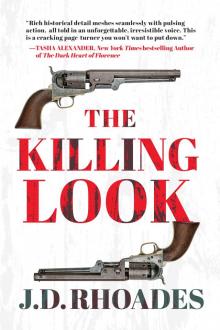 The Killing Look
The Killing Look People Like Us
People Like Us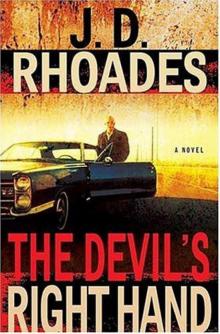 Jack Keller - 01 - The Devil's Right Hand
Jack Keller - 01 - The Devil's Right Hand Safe and Sound
Safe and Sound Ice Chest
Ice Chest Breaking Cover
Breaking Cover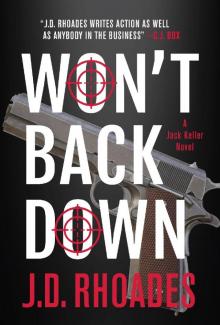 Won't Back Down
Won't Back Down Tony Wolf/Tim Buckthorn - 02 - Broken Shield
Tony Wolf/Tim Buckthorn - 02 - Broken Shield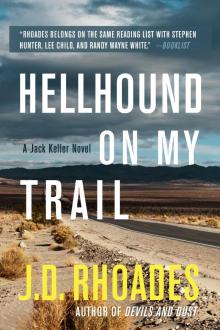 Hellhound On My Trail
Hellhound On My Trail Breaking Cover (Tony Wolf/Tim Buckthorn)
Breaking Cover (Tony Wolf/Tim Buckthorn)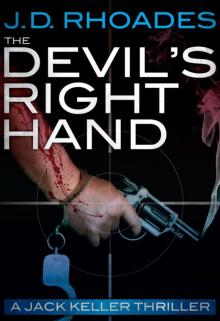 The Devil's Right Hand
The Devil's Right Hand Good Day In Hell
Good Day In Hell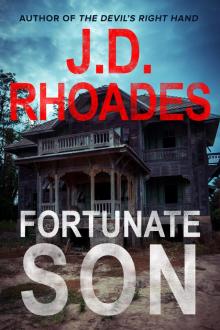 Fortunate Son
Fortunate Son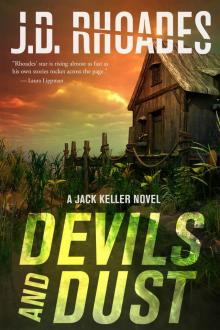 Devils and Dust
Devils and Dust